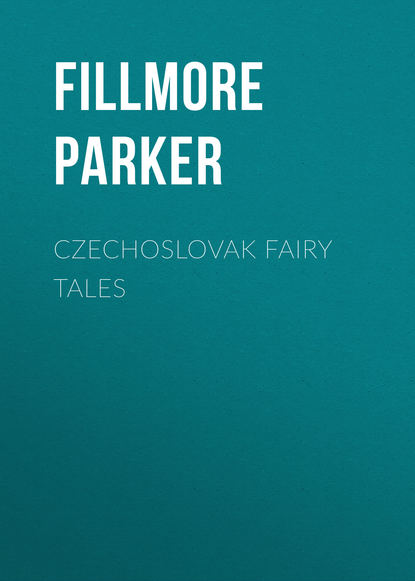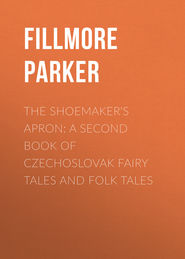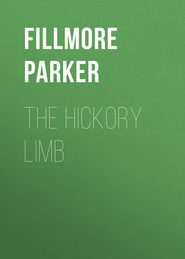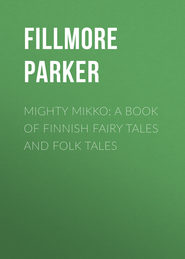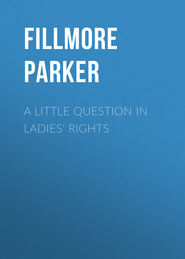По всем вопросам обращайтесь на: info@litportal.ru
(©) 2003-2024.
✖
Czechoslovak Fairy Tales
Настройки чтения
Размер шрифта
Высота строк
Поля
“You pretty thing!” she said, playing with him. “If my husband were home how pleased he would be! But he’s off visiting a third of his kingdom and he won’t be home until evening.”
Suddenly the old witch came into the room and as soon as she saw the bird she shrieked to her daughter: “Wring the neck of that cursed bird, or it will stain you with blood!”
“Why should it stain me with blood, the dear innocent thing?”
“Dear innocent mischief!” shrieked the witch. “Here, give it to me and I’ll wring its neck!”
She tried to catch the bird, but the bird changed itself into a man and was already out of the door before they knew what had become of him.
After that he changed himself again into a green bird and flew up to the window of the second sister. He pecked at it until she opened it and let him in. Then he flitted about her, settling first on one of her white hands, then on the other.
“What a dear bird you are!” cried the queen. “How you would please my husband if he were at home. But he’s off visiting two-thirds of his kingdom and he won’t be back until tomorrow evening.”
At that moment the witch ran into the room and as soon as she saw the bird she shrieked out: “Wring the neck of that wretched bird, or it will stain you with blood!”
“Why should it stain me with blood?” the daughter answered. “The dear innocent thing!”
“Dear innocent mischief!” shrieked the witch. “Here, give it to me and I’ll wring its neck!”
She reached out to catch the bird, but in less time than it takes to clap a hand, the bird had changed itself into a man who ran through the door and was gone before they knew where he was.
A moment later he again changed himself into a green bird and flew up to the window of the youngest queen. He flitted about and pecked until she opened the window and let him in. Then he alighted at once on her white hand and this pleased her so much that she laughed like a child and played with him.
“Oh, what a dear bird you are!” she cried. “How you would delight my husband if he were home. But he’s off visiting all three parts of his kingdom and he won’t be back until the day after tomorrow in the evening.”
At that moment the old witch rushed into the room. “Wring the neck of that cursed bird!” she shrieked, “or it will stain you with blood.”
“My dear mother,” the queen answered, “why should it stain me with blood – beautiful innocent creature that it is?”
“Beautiful innocent mischief!” shrieked the witch. “Here, give it to me and I’ll wring its neck!”
But at that moment the bird changed itself into a man, disappeared through the door, and they never saw him again.
The seer knew now where the kings were and when they would come home. So he made his plans accordingly. He ordered his servant to follow him and they set out from the city at a quick pace. They went on until they came to a bridge which the three kings as they came back would have to cross.
The seer and his man hid themselves under the bridge and lay there in wait until evening. As the sun sank behind the mountains, they heard the clatter of hoofs approaching the bridge. It was the eldest king returning home. At the bridge his horse stumbled on a log which the seer had rolled there.
“What scoundrel has thrown a log here?” cried the king angrily.
Instantly the seer leaped out from under the bridge and demanded of the king how he dared to call him a scoundrel. Clamoring for satisfaction he drew his sword and attacked the king. The king, too, drew sword and defended himself, but after a short struggle he fell from his horse dead. The seer bound the dead king to his horse and then with a cut of the whip started the horse homewards.
The seer hid himself again and he and his man lay in wait until the next evening.
On that evening near sunset the second king came riding up to the bridge. When he saw the ground sprinkled with blood, he cried out: “Surely there has been a murder here! Who has dared to commit such a crime in my kingdom!”
At these words the seer leaped out from under the bridge, drew his sword, and shouted: “How dare you insult me? Defend yourself as best you can!”
The king drew, but after a short struggle he, too, yielded up his life to the sword of the seer.
The seer bound the dead king to his horse and with a cut of the whip started the horse homewards.
Then the seer hid himself again under the bridge and he and his man lay there in wait until the third evening.
On the third evening just at sunset the youngest king came galloping home on the flaming steed. He was hurrying fast because he had been delayed. But when he saw red blood at the bridge he stopped short and looked around.
“What audacious villain,” he cried, “has dared to kill a man in my kingdom!”
Hardly had he spoken when the seer stood before him with drawn sword demanding satisfaction for the insult of his words.
“I don’t know how I’ve insulted you,” the king said, “unless you’re the murderer.”
When the seer refused to parley, the king, too, drew his sword and defended himself.
To overcome the first two kings had been mere play for the seer, but it was no play this time. They both fought until their swords were broken and still victory was doubtful.
“We shall accomplish nothing with swords,” the seer said. “That is plain. I tell you what: let us turn ourselves into wheels and start rolling down the hill and the wheel that gets broken let him yield.”
“Good!” said the king. “I’ll be a cartwheel and you be a lighter wheel.”
“No, no,” the seer answered quickly. “You be the light wheel and I’ll be the cartwheel.”
To this the king agreed. So they went up the hill, turned themselves into wheels and started rolling down. The cartwheel went whizzing into the lighter wheel and broke its spokes.
“There!” cried the seer, rising up from the cartwheel. “I am victor!”
“Not so, brother, not so!” said the king, standing before the seer. “You only broke my fingers! Now I tell you what: let us change ourselves into two flames and let the flame that burns up the other be victor. I’ll be a red flame and do you be a white one.”
“Oh, no,” the seer interrupted. “You be the white flame and I’ll be the red one.”
The king agreed to this. So they went back to the road that led to the bridge, turned themselves into flames, and began burning each other mercilessly. But neither was able to burn up the other.
Suddenly a beggar came down the road, an old man with a long gray beard and a bald head, with a scrip at his side and a heavy staff in his hand.
“Father,” the white flame said, “get some water and pour it on the red flame and I’ll give you a penny.”
But the red flame called out quickly: “Not so, father! Get some water and pour it on the white flame and I’ll give you a shilling!”
Now of course the shilling appealed to the beggar more than the penny. So he got some water, poured it on the white flame and that was the end of the king.
The red flame turned into a man who seized the flaming horse by the bridle, mounted him and, after he had rewarded the beggar, called his servant and rode off.
Meanwhile at the royal palace there was deep sorrow for the murdered kings. The halls were draped in black and people came from miles around to gaze at the mutilated bodies of the two elder brothers which the horses had carried home.
The old witch was beside herself with rage. As soon as she had devised a plan whereby she could avenge the murder of her sons-in-law, she took her three daughters under her arm, mounted an iron rake, and sailed off through the air.
The seer and his man had already covered a good part of their journey and were hurrying on over rough mountains and across desert plains, when the servant was taken with a terrible hunger. There wasn’t anything in sight that he could eat, not even a wild berry. Then suddenly they came upon an apple tree that was bending beneath a load of ripe fruit. The apples were red and pleasant to the sight and sent out a fragrance that was most inviting.
The servant was delighted. “Glory to God!” he cried. “Now I can feast to my heart’s content on these apples!”





